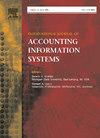Strategic AI disclosures and legitimacy: Impression management in UK FTSE100 annual reports
IF 6
3区 管理学
Q2 BUSINESS
International Journal of Accounting Information Systems
Pub Date : 2025-09-27
DOI:10.1016/j.accinf.2025.100757
引用次数: 0
Abstract
By incorporating impression management strategies with legitimacy theory, this study investigates how UK FTSE100 corporations strategically communicate their AI disclosures to achieve, sustain, and/or restore legitimacy. It employs a mixed-methods content analysis to analyse textual AI data from the annual reports of 80 UK non-financial corporations listed in the FTSE100 index (2020 to 2023). Results reveal an increasing trend among UK corporations to disclose AI narratives. This study finds that FTSE100 corporations employ a blend of ‘assertive’ and ‘defensive’ impression management tactics in AI disclosures to influence stakeholder perceptions and maintain their legitimacy. Findings also indicate a significant post-crisis shift from defensive to assertive AI disclosures, underscoring how FTSE100 corporations strategically adapted their impression management tactics to reinforce pragmatic, moral, and cognitive legitimacy. This study contributes to the literature by demonstrating how impression‑management tactics shape AI legitimacy, offering practitioners strategies for transparent communication, informing legislators on ethical AI regulation, and enabling stakeholders to interpret AI disclosures as indicators of corporate conduct.
战略性人工智能披露和合法性:英国富时100指数年度报告中的印象管理
通过将印象管理策略与合法性理论相结合,本研究调查了英国富时100指数公司如何战略性地传达其人工智能披露,以实现、维持和/或恢复合法性。它采用混合方法内容分析,分析80家英国富时100指数(FTSE100 index)成份股非金融企业(2020年至2023年)年报中的文本人工智能数据。调查结果显示,英国企业披露人工智能叙事的趋势越来越明显。本研究发现,富时100指数成分股公司在人工智能披露中混合采用“自信”和“防御性”印象管理策略,以影响利益相关者的看法并保持其合法性。调查结果还表明,危机后的人工智能披露出现了从防御性到自信性的重大转变,这突显了富时100指数企业如何战略性地调整其印象管理策略,以加强务实、道德和认知的合法性。本研究通过展示印象管理策略如何塑造人工智能的合法性,为从业者提供透明沟通的策略,向立法者通报人工智能的道德监管,并使利益相关者能够将人工智能披露解释为企业行为的指标,从而为文献做出了贡献。
本文章由计算机程序翻译,如有差异,请以英文原文为准。
求助全文
约1分钟内获得全文
求助全文
来源期刊
CiteScore
9.00
自引率
6.50%
发文量
23
期刊介绍:
The International Journal of Accounting Information Systems will publish thoughtful, well developed articles that examine the rapidly evolving relationship between accounting and information technology. Articles may range from empirical to analytical, from practice-based to the development of new techniques, but must be related to problems facing the integration of accounting and information technology. The journal will address (but will not limit itself to) the following specific issues: control and auditability of information systems; management of information technology; artificial intelligence research in accounting; development issues in accounting and information systems; human factors issues related to information technology; development of theories related to information technology; methodological issues in information technology research; information systems validation; human–computer interaction research in accounting information systems. The journal welcomes and encourages articles from both practitioners and academicians.

 求助内容:
求助内容: 应助结果提醒方式:
应助结果提醒方式:


